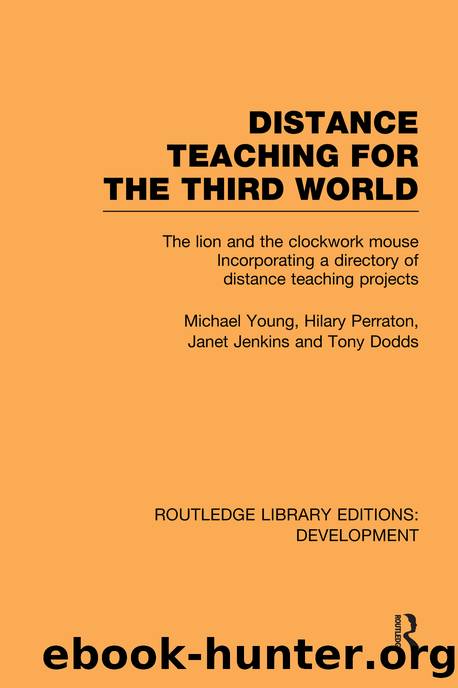Distance Teaching for the Third World by unknow

Author:unknow
Language: eng
Format: epub
ISBN: 614868
Publisher: Taylor & Francis Group
All the subjects are included at each level and in each sec tion of the courses. In the first stage for example, key words, such as 'plough', 'harvest', 'child', 'bathing', 'school', 'forests', are used as the basis for literacy training, as the themes of discussion of vital social and economic concerns, and as the source of numeracy exercises. In the second stage the discussions move on: under the heading WORK there is an investigation of the most important agricultural activities of village life, natural resources and how they are used, marketing of village produce and local employment. Common village illnesses, village hygiene, educational opportunities for 'campesino' families and nutrition are the topics related to HEALTH AND FAMILY. Under COMMUNICATION transport and road construction, telephone, radio and the press are discussed, and the use and construction of simple sentences are practised. At the same time, questions of population distribution, the local situation of peasant federations, the local land tenure system, and the local problems and set-up of workers' unions are raised as the ORGANISATION topic. Parallel and related NUMERACY exercises are introduced in measurement.
In a later stage a similar approach is used, but again at a higher level of sophistication. The productive activities of the 'campesino' are analysed, and improved techniques for the cultivation of basic grains are taught as part of the WORK syllabus. More sicentific knowledge of the common diseases, details of the local health services and how to use them, and the role of the family in education, are examined under HEALTH AND THE FAMILY. The national communications system, and the use and usefulness of letters, telegrams and telephones for 'campesinos', and dialogue as a means of promoting understanding, are themes in the COMMUNICATIONS syllabus. And an analysis of the principal characteristics of Honduran society, more detailed information about peasant organisations and workers' unions and how to participate in them, the system of government and opportunities for 'campesinos' to participate, and the role of women, figure prominently under the heading of ORGANISATION. NUMERACY continues to concentrate on the development of the basic skills of arithmetic. Table 6.1 shows two examples of a week's curriculum. (8)
The government of Honduras agreed to recognise the successful completion of a four-level PEPA course as the academic equivalent of the government's own seven year primary school programme. More important than government equivalency recognition, however, was the linking of the radio schools to peasant organisations and unions, and the integration of academic content with social, economic and political concerns. ACPH's curriculum and its organisation both attempted to demonstrate in practical ways the relationships between education, development, political organisation and liberation.
Download
This site does not store any files on its server. We only index and link to content provided by other sites. Please contact the content providers to delete copyright contents if any and email us, we'll remove relevant links or contents immediately.
The Giant and How He Humbugged America by Jim Murphy(3448)
The Science Book (Big Ideas Simply Explained) by DK(3286)
The Elements by Theodore Gray(3057)
Harry Potter: A History of Magic by British Library(3048)
A Short History of Nearly Everything by Bryson Bill(2698)
Easy Electronics by Charles Platt(2331)
Make by Mike Westerfield(2319)
The Astronomy Book by DK(2156)
The Cat in the Hat by Dr. Seuss(2140)
Science Experiments You Can Eat by Vicki Cobb(1888)
CLICK'D by Tamara Ireland Stone(1879)
Think Like a Rocket Scientist by Ozan Varol(1819)
Calling All Minds by Temple Grandin(1805)
03 The Prophet of Yonwood by Jeanne DuPrau(1789)
The Crime Book (Big Ideas Simply Explained) by DK(1785)
Minecraft by Mojang Ab(1778)
Pax by Sara Pennypacker(1761)
Martin Gardner's Science Magic by Martin Gardner(1734)
Getting Started with Soldering: A Hands-On Guide to Making Electrical and Mechanical Connections by Vinck Marc de(1698)
